By continuing to truly focus upon babies, we want to make the world more baby-friendly.
At the same time, we aim to achieve sustainable growth as a company by reducing environmental impact and solving social issues surrounding babies and mothers in all countries and regions where we conduct business activities. We particularly recognize the urgency of climate change. Pigeon’s Seventh Medium-Term Business Plan identifies climate change as one of the most important management challenges and outlines measures to tackle it.
Reduction Targets and Results (Scope 1 & 2)
In our 7th Mid-Term Management Plan (2020-2022), the reduction target of Co2 emissions (Scope 1 & 2) for the entire Group is set as 10% compared to FY2018 (per unit of sales), and are implementing our actions to reduce these emissions.
from 2018 base year
CO2 Emission Reduction Results per Business Segment (Scope 1 and 2)
In FY2020 the Pigeon Group’s CO2 emissions of Scope 1 and 2 totaled 24,922 t-CO2. This result constituted a reduction from the base year figure of 2,344 t-CO2 or 8.6%.
Unit:t-CO2
| Business segment | FY2018 CO2 (base year) |
FY2019 | FY2020 | ||
| CO2 | Reduction (vs FY2018) | CO2 | Reduction (vs FY2018) | ||
| Group total | 27,266 | 25,785 | -1,481 | 24,922 | -2,344 |
|---|---|---|---|---|---|
| Japan Business | 5,881 | 5,301 | -580 | 4,890 | -991 |
| China Business | 9,974 | 8,859 | -1,116 | 8,902 | -1,072 |
| Singapore Business | 10,629 | 10,516 | -112 | 10,546 | -82 |
| Lansinoh Business | 782 | 1,109 | 327 | 584 | -198 |
CO2 Reduction Initiatives and Results
Use of Renewable Energy
The Pigeon Group advances the use of renewable energy as a means of reducing emissions of greenhouse gases. In 2020 renewable energy comprised 4.8% of total energy consumed by the Group, contributing to a 1,200t reduction in CO2 emissions.
On August 1, 2021, the Pigeon Group’s head office in Chuo Ward, Tokyo began using renewable energy. The Group head office thus became the first Pigeon Group facility to achieve 100% use of renewable energy, reducing CO2 emissions by 252 t per year.
The Group began introducing solar power generation facilities in May 2019 with projects in two Group companies located in China, Pigeon Industries (Changzhou) Co., Ltd. and Pigeon Manufacturing (Shanghai) Co., Ltd. Subsequently, solar power generation facilities were introduced at Pigeon India Pvt. Ltd. in October 2019 and at PT Pigeon Indonesia in September 2020. In January 2021, installation of solar-power generation facilities was completed at Thai Pigeon Co., Ltd. in Thailand.
In Japan, adoption of hydroelectric power is beginning in FY2020 at Pigeon Manufacturing Hyogo Corporation and Pigeon Manufacturing Ibaraki Corporation.
The Pigeon Group will continue to expand its adoption of renewable energy in Japan and overseas, and further advance our efforts for reduction of greenhouse gas emissions.
-
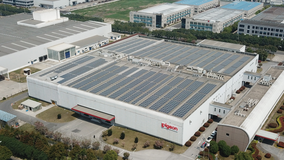
PIGEON INDUSTRIES (CHANGZHOU) CO., LTD.
-
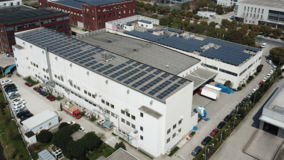
PIGEON MANUFACTURING (SHANGHAI) CO., LTD
-
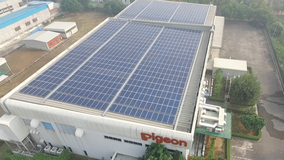
PIGEON INDIA PVT. LTD.
-
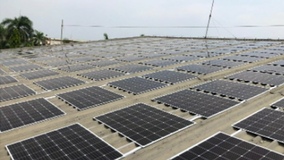
PT PIGEON INDONESIA
-
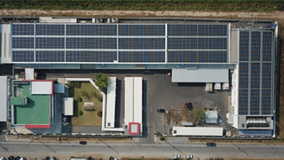
THAI PIGEON CO., LTD.
|
FY2020 |
|||
|
Amount of Usage (thousand kwh) |
Share of Electricity Consumption of Pigeon Group (%) |
CO2 Reduction (t-CO2) | |
|
Total Consumption of Renewable Energy |
1,863 | 4.8% | 1,203 |
|---|---|---|---|
| Of which: Total of Solar Energy | 1,164 | 3.0% | 946 |
| PIGEON INDUSTRIES (CHANGZHOU) CO., LTD. | 774 | 2.0% | 623 |
| PIGEON MANUFACTURING (SHANGHAI) CO., LTD. | 162 | 0.4% | 130 |
| PIGEON INDIA PVT. LTD | 217 | 0.6% | 184 |
| PT PIGEON INDONESIA | 12 | 0.0% | 8 |
| Of which: Total of Hydroelectric Energy | 699 | 1.8% | 257 |
| Pigeon Manufacturing Hyogo Corporation | 500 | 1.3% | 167 |
| Pigeon Manufacturing Ibaraki Corporation | 199 | 0.5% | 90 |
Other Activities
- Cessation of use of fuel oil generating equipment
To reduce greenhouse gas emissions, in FY2020 Pigeon Manufacturing Hyogo ceased using on-site generating equipment fed by heavy oil. - Reduction in number of trucks and containers used to transport materials
Pigeon Manufacturing Ibaraki is increasing its lading efficiency per container when shipping materials, thereby reducing the number of trucks required for shipping. - Reduction of energy consumption by adopting LED lighting
The Central Laboratory and Pigeon Manufacturing Ibaraki are switching over to LED lighting, thereby reducing energy consumption at their business locations.
Further Initiatives
Climate change is an urgent issue for the entire world. Determined to invigorate our response to this challenge, we have started calculating GHG gas emissions (Scope 3) throughout our supply chain in all of our business scopes and are analyzing the risks and opportunities for our business due to climate change.
In addition, although we have not introduced ICP (Internal Carbon Pricing), we are discussing the setting of long-term reduction targets in consideration of the future rise of carbon taxes and Japan's reduction target of carbon neutrality by 2050. During the discussion process, we refer to the IEA's forecast of carbon tax increase in order to promote shifts to renewable energy, application of renewable energy certificates, and capital investment for the purpose of energy conservation and on-sites renewable energy generation.








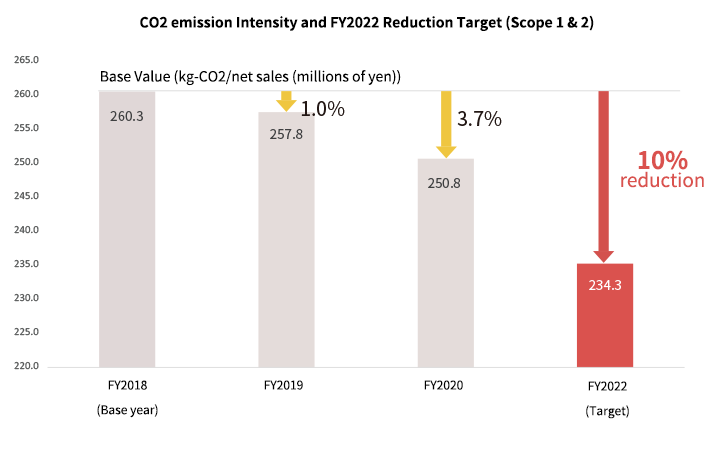
(Scope 1 & 2)
10% from 2018 base year.